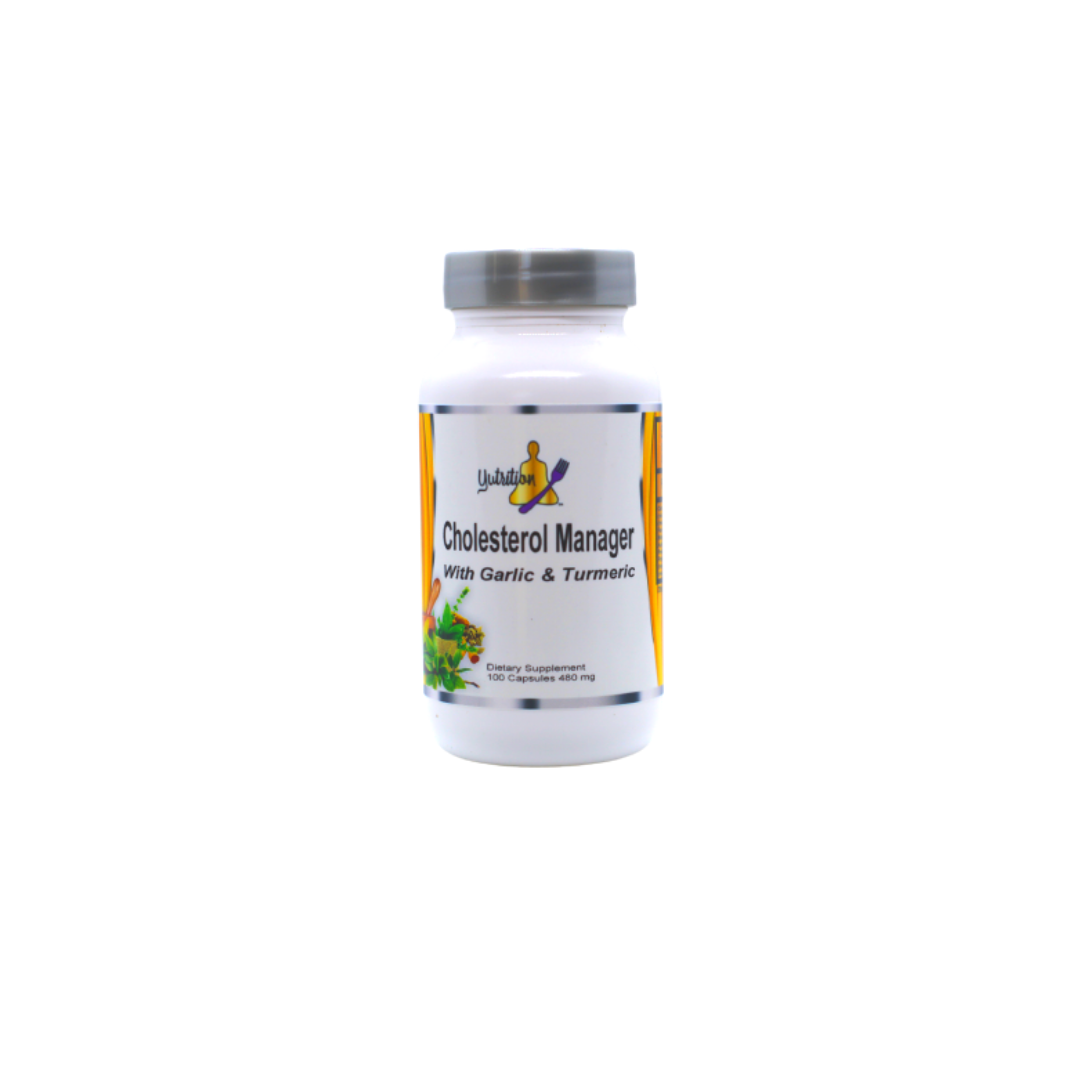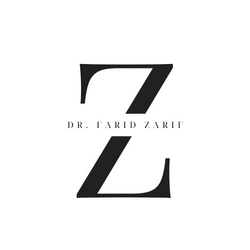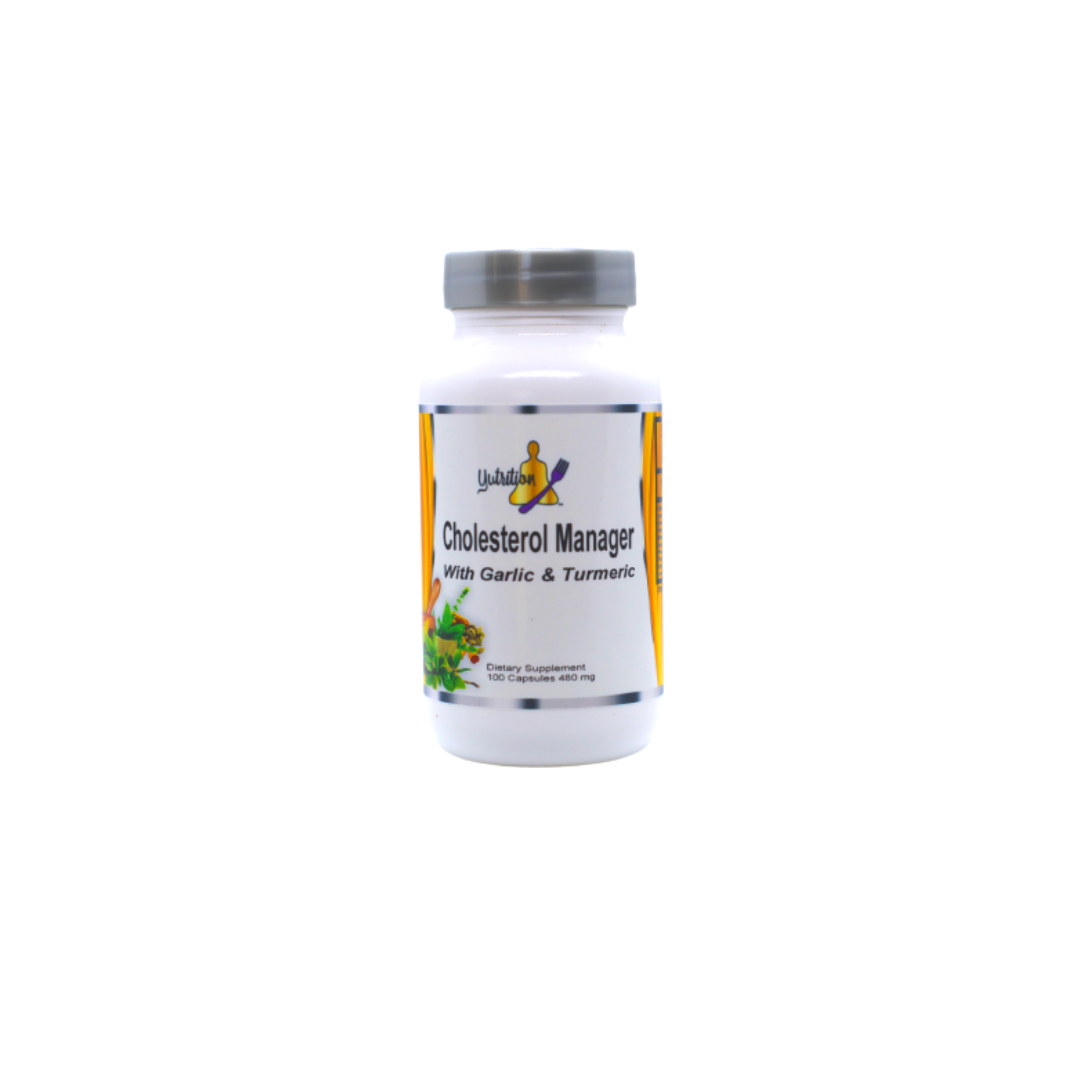Executive Life Diet Store
Cholesterol Manager
Couldn't load pickup availability
Cholesterol is a substance that is waxy or fatty which occurs naturally in the body and is produced primarily in the liver. The body needs it for nerve function, cell membrane creation and hormone production. When there is a disturbance in the body’s natural use of cholesterol, high cholesterol can be a result.
High cholesterol can lead to atherosclerosis (cholesterol gathering into plaque which clogs the arteries) which impedes blood flow to the brain, kidneys, heart, genitals and extremities. Once this happens, high blood pressure can result, mental impairment and later stroke or heart attack. Gallstones can be a result of high cholesterol.
Diet, lack of exercise, smoking, and high blood-sugar levels can lead to high cholesterol. Millions of Americans suffer with this problem. Our CHOLESTEROL formula contains herbs which can help with the problem of high cholesterol.
Following is a list of herbs in this formula:
GARLIC
TUMERIC
BAYBERRY
CAYENNE
HAWTHORN BERRY NIACINAMIDE, OR VITAMIN B-3 LECITHIN
FENUGREEK. MILK THISTLE, BLACK COHOSH, SASSAFRAS, APPLE PECTIN, CITRUS PECTIN, ALFALFA. PLANTAIN, BLADDERWRACK, SPEEDWELL, RHUBARB, CANAIGRE
Recommendation: 2 capsules three times a day.
What is Cholesterol?
Cholesterol gets a lot of negative publicity. With all of the information out there on the internet it would be easyu to get very confused and assume that all cholesterol is BAD. Most people are surprised to learn that cholesterol is actually necessary for our existence. It is also surprising is that our bodies specificaally our liver actually produces cholesterol naturally. To sum this up cholesterol isn’t all good, nor is it all bad — it’s a complex topic and one worth knowing more about.
Cholesterol is a major component of all cell membranes and is used to make essential molecules such as hormones, fat-soluble vitamins, and bile acids to help you digest your food. You may also see a measurement for triglycerides on your lipid panel. Like cholesterol, triglycerides are a type of blood fat. To break all that down - cholesterol serves three main purposes. It aids in the production of sex hormones - it’s a building block for human tissues - and it assists in bile production in the liver.
-
Hormone Manufacturing
- One of the most important jobs of cholesterol is to aide in the production of hormones. Cholesterol is stored in the adrenal glands, ovaries and the testes and is converted to steroid hormones. These steroid hormones perform other vital duties to help the body function properly. Without this function from cholesterol human could have issues with weight, sex, digestion, bone health and mental status.
-
Digestion
- Cholesterol is used to help the liver create bile which aids us in digesting the food that we eat. Bile is an acidic gel like substance that starts the breakdown of undugested food. The organ that assists in the storage of bile produced by the liver is the gall bladder. Without the bile our bodies are unable to properly digest foods, especially fats. When the fat goes undigested it can get into the bloodstream and cause additional problems such as blockages of the arteries and cause heart attacks and heart disease. Needless to say that too little cholesterol is just as bad for the heart and intraveinous system as too much cholesterol.
-
Building Blocks
- Cholesterol is a structural component of cells. Cholesterol along with polar lipids make up the structure of each and every cell in our bodies. Cholesterol is there to basically provide a protective barrier. When the amount of cholesterol increases or decreases, the cells are affected. This change can affect our ability to metabolize and produce energy. This can ultimately affect other aspects of our bodies' function such as food intake and digestion.
We measure cholesterol production in the blood, but it is actually found in every cell in the body. The Harvard Special Health Report Managing Your Cholesterol explains cholesterol as a waxy, whitish-yellow fat and a crucial building block in cell membranes. Cholesterol also is needed to make vitamin D, hormones (including testosterone and estrogen), and fat-dissolving bile acids. In fact, cholesterol production is so important that your liver and intestines make about 80% of the cholesterol you need to stay healthy so only about 20% comes from the foods you eat. And yet we place so much emphasis on the cholesterol in the foods that we eat.
How does cholesterol cause coronary heart disease (CHD)?
Coronary Heart Disese is caused by cholesterol when the blood vessels to the heart - the coronary arteries - become narrowed or somewhat blocked by a gradual build-up of a fatty coating on the inside walls. This coating is usually a build up od LDL cholesterol cells. The LDL cholesterol cells begin to oxidize and become hard. The hardening (of the artery) is a condition called atherosclerosis.
HDL cholesterol is tasked to remove LDL cholesterol from the circulation, thus protecting against CHD. So the balance between the two substances is vital. Individuals with a high level of HDL and a low level of LDL in the blood are the least likely to suffer from a stroke or heart attack caused by choles
The difference between a vegan and a plant-based diet
The difference between a vegan and a plant-based diet
The difference between a vegan and a plant-based diet
Is a plant-based diet the same thing as a vegan diet? Both meal plans have made headlines for their health benefits in recent years and while they are similar, there are some key differences: Vegan diets eliminate all animal products, while plant-based diets do not necessarily eliminate animal products, but focus on eating mostly plants, such as fruits, vegetables, nuts, seeds and whole grains.
What is a vegan diet?
“With a vegan diet, you eliminate all animal products, including dairy, meat, poultry, fish, eggs and honey,” says, Dr. Farid Zarif a bariatric medicine nutritionist, founder of Rhythmic Ingestion, author of "Slaves of the Tongue".
Some people choose to follow a vegan diet for ethical, environmental or health reasons. While going vegan can have health benefits, there are some pitfalls to avoid.
“Just because something is vegan doesn’t mean it’s healthy,” he says. “If you’re vegan, you can still technically eat vegan cookies, potato chips and other vegan junk food, which can be high in calories and low in nutrients. I recommend sticking to whole foods as much as possible.”
What is a plant-based diet?
Plant-based diets also emphasize eating whole foods, meaning the food has undergone little – if any – processing and is as close to its natural state as possible.
Plant-based foods include:
Whole grains (quinoa, farro, barley, oatmeal)
Plant-based oils (avocado, olive, canola)
What is the right meal plan for you?
“Regardless of what meal plan you choose, everyone’s diet should ideally consist of 50 percent vegetables,” says Dr. Zarif. “Fruit is healthy too, but I like to focus on vegetables because they have less sugar.”
When building your plate, aim for:
50 percent vegetables
25 percent whole grains
25 percent lean protein
“If you are not eating meat or other animal proteins like eggs, try beans or quinoa for plant-based protein,” he says.
Adding healthy fats – such as avocado oil when roasting veggies, a sprinkle of slivered almonds on your oatmeal or sliced avocado on your salad – will help you feel full for longer. And healthy fats have numerous other health benefits.
When to talk to your doctor about your diet
“It’s a good idea to see your primary care doctor to get a basic framework for what a healthy diet should look like for you, particularly if you have an underlying health condition or have had weight loss surgery, which can affect how your body processes nutrients,” says Dr. Zarif. “For example, if you have diabetes and want to eat healthily, be sure to eat small portions, not to exceed 2 servings”.
Also, if you are vegan, vegetarian or don’t eat many animal products, she recommends asking your doctor to check your B vitamin levels.
“B12 deficiency is common in vegans because it’s a nutrient that we need to know more about, along with its varying sources,” he explains. “If you don’t consume many animal products, talk to your doctor about taking a supplement.”
Calcium is another important nutrient that can be hard to get when you don’t eat dairy products. Dr. Zarif recommends eating and drinking calcium-fortified plant-based milk (like almond milk) or other calcium-fortified foods.
“If you’re not getting three servings of calcium-rich foods each day, ask your doctor about adding a supplement,” he says. “Try to get at least some calcium from your diet because taking too many calcium supplements can cause adverse side effects.”
Is a vegan or plant-based diet healthy?
If you eat plenty of vegetables, fruits, healthy fats and whole grains, you should still get a good chunk of your daily vitamins and minerals because plant-based foods are high in many nutrients.
“If you’re going to follow a vegan or plant-based diet, think through it carefully and plan out your meals,” says Dr. Zarif. “You don’t necessarily have to go vegan to be healthy – plant-based is a good option for people who struggle with consistency and planning. If you are going to commit to a vegan diet, make a plan and be consistent about incorporating all the healthy food groups, including plant-based protein, so you don’t miss out on nutrients.”
What this book may do for you
What this book may do for you
Help you to change the narrative of outdate and ineffective lifestyles.
Shipping
Shipping
Share

Subscribe to our emails
Be the first to know about new collections and exclusive offers.

